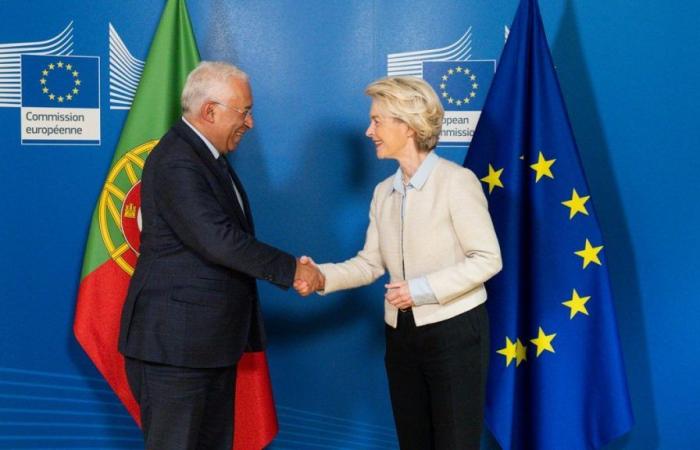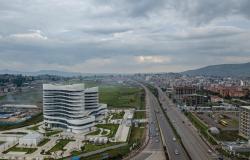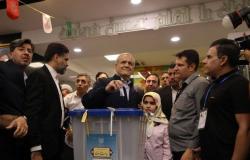
The two-day summit will focus on key EU positions, the strategic agenda for the next five years, military support for Ukraine and the war between Israel and Hamas.
The 27 leaders of the European Union are due to meet on Thursday to finalize the agreement which will allocate the Union’s main posts for the next five years.
The names on the table are now well known: Ursula von der Leyen as President of the European Commission, António Costa as President of the European Council and Kaja Kallas as High Representative for Foreign Affairs and Security Policy.
This trio was formed on the basis of their proven political skills on the European scene, but also because of the absence of credible alternatives likely to serve as plan B.
After a failed attempt last week, the six negotiators from the main centrist parties – the Pole Donald Tusk, the Greek Kyriakos Mitsotakis, the German Olaf Scholz, the Spaniard Pedro Sánchez, the French Emmanuel Macron and the Dutch Mark Rutte – called at the beginning of the week and reconfirmed the selection.
The centre-right European People’s Party (EPP), the big winner of the elections, has given up on demanding that one of its members replace Mr Costa on the European Council at the end of his two and a half year mandate. This request aroused the anger of the socialists, who bet big on Mr. Costa despite the legal setbacks of the former Portuguese prime minister.
The negotiators “agreed to support the established practice of continuity and support the elected candidate for the entire legislative cycle”said a diplomat after the joint call.
That means the EPP will retain control of the Commission, the bloc’s most powerful institution, and the socialists will take the reins of the Council, which hosts high-level leaders’ meetings. Liberals Europe Renewal, who suffered heavy losses in the elections, will be given the post of high representative, the EU’s top diplomat.
For Ms Kallas, this is a consecration after she was removed from the post of NATO Secretary General because of her hostile positions towards Russia. The same reason was initially given against his possible candidacy for the post of High Representative, but concerns gradually dissipated. Geography worked in her favor: Eastern Europeans have long insisted that one of the three top jobs go to one of their own, making Ms. Kallas the ideal candidate.
However, the VDL-Costa-Kallas agreement must be approved by all 27 leaders before becoming a reality. At the same time, heads of state and government will agree on a strategic agenda which will define the main priorities for the coming mandate.
If they are ultimately appointed, Ms von der Leyen and Ms Kallas will have to undergo a public hearing and a confirmation vote in the European Parliament.
Giorgia Meloni contests the nomination trends in the EU
The decision regarding the highest positions is taken by reinforced qualified majority, i.e. 20 Member States representing at least 65% of the population of the European Union. As the EPP, Socialists and Liberals occupy most of the seats in the Council, the provisional agreement has received the necessary approvals to be formally blessed.
However, given the political sensitivity of the decision, which will have ramifications for the next five years, the Council prefers to distribute the positions of responsibility by consensus, obtaining as many favorable votes as possible.
There is one key vote that all guests will be looking forward to: that of Giorgia Meloni.
The Italian Prime Minister, who belongs to the right-wing group of European Conservatives and Reformists (CRE), was excluded from negotiations between the three centrist parties, which she greatly displeases. Mr. Mitsotakis was responsible for informing Ms. Meloni of the outcome of the joint call, but, according to La Stampa, she never picked up the phone.
“No true democrat who believes in popular sovereignty can, in his heart, consider it acceptable that in Europe there has been an attempt to negotiate on leading positions even before citizens go to the polls.”declared Ms. Meloni before the Italian Parliament on Wednesday.
The draft agreement, she added, goes against the logic of consensus because it does not include “those on the opposite political camp and those from nations considered too small to be worthy of a seat at the tables that matter”.
The Czech Petr Fiala, another member of the ECR, and the Hungarian Viktor Orbán, who has not been politically affiliated for years, also expressed their discontent and demanded greater inclusion in the negotiations.
Mr Orbán is fiercely opposed to Ms von der Leyen, who partially froze the country’s recovery and cohesion funds in response to its continued democratic backsliding, but has no objection to Mr Costa and Ms .
Abstention constructive
Diplomats and officials agree that proper discussion must take place among all leaders to avoid the appearance of agreement “accepted automatically”. The deal is expected to be concluded during the day on Thursday, with President Macron eager to return to France to resume campaigning ahead of the first round on Sunday of the snap legislative elections he called following the crushing defeat of his party in the European elections.
“Our goal will be to have as many people on board as possible”a senior EU official said, noting that Mr. Meloni has the option to abstain rather than vote against.
“It is sometimes necessary to evaluate the reasons why they (leaders) abstain. One of them was forced to abstain last time”the official added, referring to Chancellor Angela Merkel, whose coalition asked her to abstain in 2019 when Ms. von der Leyen was surprisingly high.
Since the hard right has virtually no chance of securing a top position, those on the sidelines are aiming for important portfolios in the next European Commission as compensation.
Italy, in particular, has great ambitions.
“We want a vice-president at the European Commission. A strong commissioner to promote good policies in favor of industry and agriculture”said Italian Foreign Minister Antonio Tajani, giving an idea of what Rome is looking for.
Ms Meloni could use Thursday’s meeting to present her demands to Ms von der Leyen on a bilateral basis. But a senior diplomat said that “shouldn’t happen this way”.
“Mrs von der Leyen will have to decide for herself when she has all the candidates to form the next Commission”declared the diplomat.
In addition to senior positions, the two-day summit will address other priority issues, such as military support for Ukraine (including 6.6 billion euros rare blocked by Hungary), the situation in Georgia and the war between Israel and Hamas, with emphasis on Lebanon.
Ukrainian President Volodymyr Zelensky will make a brief appearance in person at the Council to sign security commitments between the EU and Ukraine.
The summit will mark Mark Rutte’s final intervention after 14 uninterrupted years as Dutch prime minister. He will soon become the next Secretary General of NATO.





